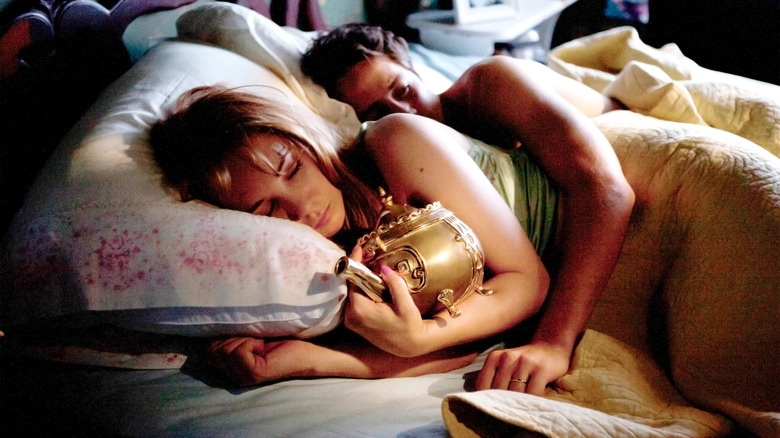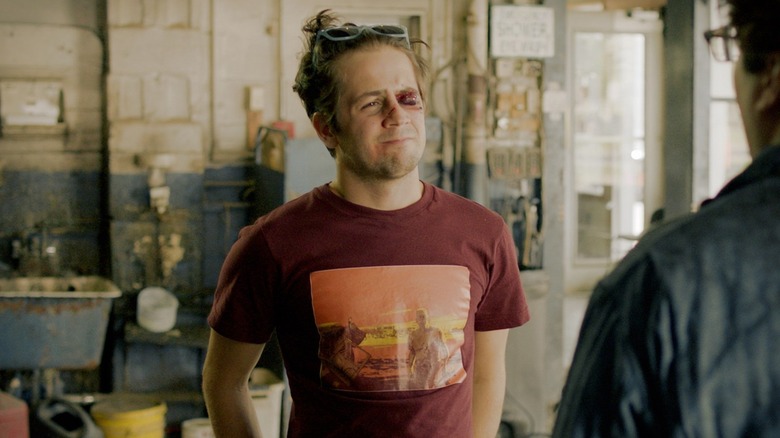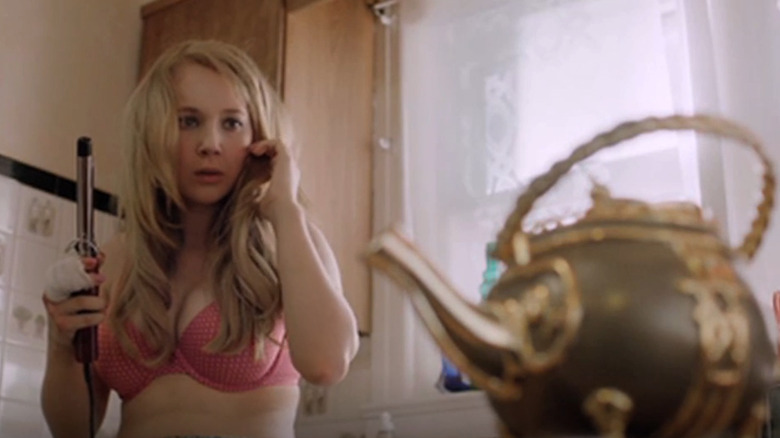The Daily Stream: The Brass Teapot Embraces Slapstick In The Face Of The American Capitalist Hellscape
(Welcome to The Daily Stream, an ongoing series in which the /Film team shares what they've been watching, why it's worth checking out, and where you can stream it.)
The Movie: "The Brass Teapot"
Where You Can Stream It: Hulu
The Pitch: What are you willing to do to achieve financial security? In this magical, modern fable, newlyweds John (Michael Angarano) and Alice (Juno Temple) are riding the struggle bus in terms of making ends meet. John rides a bicycle to his low-paying telemarketing job only to get fired. Alice was voted "Most Likely To Succeed" in high school and is now "slumming it" with John. Now, those intrusive thoughts of whether marrying for love is actually worth it start trickling in for the two of them. Just when things seem like they can't get any worse, Alice shoplifts a brass teapot from an antique store that they soon discover possesses magical powers. Anytime the two of them injure themselves, the teapot instantly provides money. The more they hurt themselves, the bigger their profit, but this get-rich-quick scheme is, as expected, too good to be true. The couple realize that emotional pain triggers a bigger payout, which means their financial stability hinges on whether or not the two can destroy one another ... and the friends and family that might as well only exist as an untapped resource for their future funds.
Why it's essential viewing
When "The Brass Teapot" debuted in 2012, America was reeling in the aftermath of the Great Recession. We had only just begun having conversations about how student loan debt was destroying an entire generation, millennials hadn't yet been labeled the "killers" of markets we could no longer afford, and people hated "The Brass Teapot." Juno Temple hadn't yet become one of the most loved characters on "Ted Lasso" and Michael Angarano was still trying to shake off his mainstream reputation as the superhero teen in "Sky High." The film takes the cautionary horror story of W.W. Jacobs' "The Monkey's Paw" and twists it into a modern parable about the lengths people are willing to go to defeat the capitalist hellscape of American living.
Temple and Angarano have some of the best on-screen chemistry of a young comedic couple you'll ever see, and the movie is inarguably at its strongest when the two are reminding us how they ended up in the first place, and why they've stayed together despite their financial woes. As the film shifts into slapstick physical comedy like a live-action "Looney Tunes" cartoon, they only become more endearing. The duo completely throw themselves into the bit, and the film is better for it. "The Brass Teapot" only works because neither of them half-ass their self-inflicted pain, and treat even the most ridiculous forms of torture, like getting a Brazilian wax, with the utmost seriousness. It makes the film painfully and hilariously relatable, especially for anyone who also woke up this morning realizing they have to pay rent after the July 4th holiday and are praying their landlord isn't going to consider it "late" because (most) banks were closed on the 1st.
Melding ancient superstition with contemporary sensibilities
The teapot turns out to be an ancient heirloom, adorned with golden stars of David on the side and makes targets of John and Alice from Hasidic Jewish henchmen (Thomas Middleditch, Robert Michael McClure), a mysterious Asian man (Stephen Park), and their white-trash landlord (Billy Magnussen), all determined to get it back. Director Ramaa Mosley, a Jewish woman, said she was drawn to the story because she's a deeply superstitious person in her personal life, telling Variety "You know when you throw something in the trash can and it doesn't go in? I'm like, 'Oh no, that's bad luck!'" Mosley plays with and satirizes harmful stereotypes of "mystical money-grabbers," and does so in a way that 2012 audiences weren't ready to have a nuanced discussion about just yet. Depiction is not endorsement, my friends, and Mosley is pointing out why these stereotypes are harmful with intention and humor.
The teapot's origins are revealed as a corruptive omen responsible for the actions of some of the most nefarious figures in history, with John and Alice soon to join their deplorable ranks if they allow the teapot to continue bringing them down this path of destruction. Money can't buy happiness, but it sure as hell can make life a lot easier to survive, and it's hard not to empathize with their decisions. Unlike a film like "Cheap Thrills" or "Would You Rather?," the darkly comedic "The Brass Teapot" never crosses the line into thriller territory, despite its increasingly serious moral conundrums. Alice is the first to lose her sense of humanity, and it's unfortunately, weirdly understandable.
For the record: I'm not going to ruin the lives of my friends, coworkers, or family members for financial gain. But...
Yes, I would burn myself with a curling iron for $700
Maybe people were less cynical in 2012 with Obama well into his presidency and citizens high on promises of hope, but "The Brass Teapot" has only felt more resonant and relevant as the years have passed. It's become increasingly difficult to survive. Housing prices are skyrocketing, gas prices are out of control, few employers provide a livable wage, we're heading toward another recession, civil unrest is bubbling to a boilover, and to top it all off, we're still in a pandemic. It's to the point where a majority of people would absolutely be willing to put themselves in harm's way if it meant they didn't have to worry about paying their bills.
It's why "Squid Game" was such a popular show, and why the upcoming reality competition version of the series is so unfathomably bleak. "The Brass Teapot" taking a comedic approach to the financial struggles a majority of us are forced to endure is weirdly cathartic, and certainly makes me feel a lot less crazy about the things I'd be willing to do to keep myself financially protected ...and I know I'm not alone.



